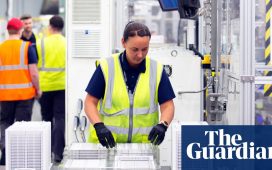Carmakers in the UK will still be mandated to sell electric vehicles from 1 January or face fines, despite Rishi Sunak’s uturn on banning new petrol and diesel vehicles, under plans expected to be confirmed by ministers this week.
Manufacturers are calling for clarity and support, as the decision to press ahead with a mandate on car sales appears to clash with plans outlined on Wednesday by the prime minister, who said he would push back the date by which consumers will have to buy electric vehicles (EVs) by five years to 2035.
More than 20% of each manufacturer’s new cars sold in 2024 must be zero-emission or they will potentially face fines of £15,000 per vehicle, under the targets proposed in a government consultation this year.
Ministers may decide to dilute the requirements but industry leaders have been told plans for some level of sales target are expected to be confirmed this week. It comes despite the prime minister’s decision to upend important green policies including by scrapping the 2030 deadline for sales of new combustion engine cars.
The U-turn on 2030 has angered and perplexed much of the industry, which has been working towards the transition to electric but now faces further uncertainty over investment and a delay that could suppress demand for several years.
Ford criticised the change and warned it would undermine the move to electric, although Jaguar Land Rover said the move was pragmatic and brought the UK into line with other countries.
Mike Hawes, the chief executive of the Society of Motor Manufacturers and Traders (SMMT), said: “[The industry’s] commitment to a zero-emission new car and van market remains unchanged.”
But he added: “Consumers need encouragement to buy more than ever”, and called for “a package of attractive incentives and measures to accelerate charging infrastructure to give consumers the confidence to switch”.
The SMMT had warned this week that the end of incentives such as grants for electric cars for private buyers was undermining mass market demand, with the growth in EVs as a share of all new UK car sales slowing to about 16%, while most sales were to corporate buyers only.
Details of the mandate remain unclear despite the imminent start date, with the government yet to respond to its public consultation on the proposals, which closed in May. A response could come by the end of the week, according to industry sources.
Under current plans, the proportion of EVs must be at least 22% in 2024, rising to 80% by 2030, and would 100% by 2035, when sales of hybrid cars would also be prohibited. Manufacturers have called for loopholes in the system, including trading quotas or buying credits, to allow more leeway for individual firms in the transition.
Criticism continued to increase over Sunak’s decision to defer the ban on new petrol and diesel sales, affecting the charging sector as well as manufacturers, and uniting industry and environmental groups.
after newsletter promotion
Robert Llewellyn, the founder of the Fully Charged Show, an EV online news channel, said: “The UK car industry is unified behind the need to accelerate the battery electric vehicle market in the UK. Any dilution of the mandate will have the opposite effect on adoption in the UK.”
Maria Bengtsson, the electric vehicle lead at the consultants EY UK, said a potential delay to the mandate could buy time for some manufacturers but would “mean frustration for key players who have already made significant investments and changes in anticipation of the original 2024 deadline”.
Silviya Barrett, from the Campaign for Better Transport, said: “Delaying the 2030 phase out of new petrol and diesel vehicles gets rid of a target the government was already on track to meet and that the motor industry widely agrees is not only achievable, but very necessary.”
Sally Foote, the UK managing director of the car-buying platform Carwow, said it would “leave many feeling frustrated and calling for clarity, support and an assurance that the goalposts won’t move again.”
The Department for Transport has been approached for comment.










